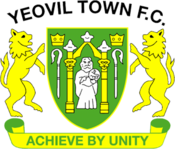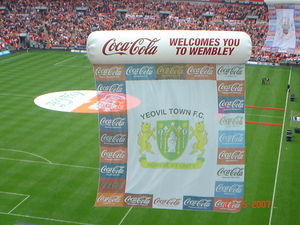Yeovil Town F.C.
 |
|||
| Full name | Yeovil Town Football Club | ||
|---|---|---|---|
| Nickname(s) | The Glovers | ||
| Founded | 1895 (as Yeovil Casuals) | ||
| Ground | Huish Park Yeovil (Capacity: 9,665 (5,212 seated)) |
||
| Owner/Chairman | John Fry | ||
| Manager | Terry Skiverton | ||
| League | League One | ||
| 2009–10 | League One, 15th | ||
|
|||
Yeovil Town F.C. are an English association football team based in Yeovil, Somerset. The club play in League One after having won the League Two championship in 2004-05.
Since the 2003-04 season they have played in green and white hoops.
They won promotion to the Football League as Conference champions in 2003, and had long been established as the most successful non-league team in the FA Cup – having defeated major Football League teams, most famously Sunderland in the 4th Round in 1949, going on to play in front of more than 81,000 against Manchester United at Maine Road.
Prior to breaking into the Football League. Yeovil won the FA Trophy with a 2-0 win against Stevenage Borough. Former Yeovil player Adam Stansfield, who died of cancer in August 2010, won man of the match in the final at Villa Park.
They play their home games at Huish Park, built in 1990 on the site of the Old Army Camp at Houndstone and named after their former home at Huish, itself famous for the notorious pitch, which had an 8-foot sideline to sideline slope. The new ground has a capacity of just under 10,000 but allowance has been made for future expansion to a stadium of up to 20,000.
The club released a record prior to the FA Cup third round tie against Liverpool in January 2004, sold only in shops in the town, "Yeovil True" reached #36 in the UK Singles Chart.[1]
Contents |
History
Non-League football
Yeovil Football Club was founded in 1890, and shared their ground with the local rugby club for many years. Five years later they were renamed Yeovil Casuals and started playing home games at the Pen Mill Athletic Ground. In 1907 the name Yeovil Town was adopted, which on amalgamation with Petters United became Yeovil and Petters United.[2]
The club came to national attention as 'giant-killers' during the 1948-49 FA Cup,[3] in which they defeated Sunderland 2-1 in the fourth round, in front of a record home attendance of 17,000. They were defeated 8–0 in the following round by Manchester United at Maine Road.[4]
Between 1955 and 1973 they were champions of the Southern Football League three times, with the runners-up spot being reached on two occasions.[5] During this period, Yeovil Town applied for election to the Football League on a number of occasions, coming within a few votes of being elected in 1976. [6] In 1979 the Glovers were founder members of the new national non-league division, the Football Conference. In 1985, they were relegated to the Isthmian League. Yeovil won that championship in 1988 and returned to the Conference.
There was success in the Bob Lord Challenge Trophy in 1990 and three years later Yeovil finished fourth in the Conference, their best finish ever.[5] In January 1995, former Weymouth and Spurs player Graham Roberts was appointed manager, but demotion back to the Isthmian League soon followed. Yeovil secured promotion back into the Conference in 1997 after winning the Isthmian League with a record number of points - 101.[5]
Colin Lippiatt became manager 1998 - 1999 and brought Terry Skiverton,to the club as a player. Gary Johnson took over as manager in June 2001 and Yeovil won the FA Trophy in his first season in charge with a 2–0 victory over Stevenage Borough in the final at Villa Park - the club's first major trophy.[5] Yeovil Town earned promotion to the Football League in the following season, by winning the Football Conference by a record 17 points margin, accumulating 95 points and scoring 100 goals, remaining unbeaten at Huish Park. Their team included many top players, some of which went on to play Premier League football. Notable players include Gavin Williams who moved to West Ham United, Lee Johnson, Chris Weale, Darren Way and Adam Lockwood.
Reaching the Football League
Yeovil's first game in the Football League was a 3-1 away win over Rochdale. The Glovers finished their first season in eighth position, and reached the third round of the FA Cup before losing 2–0 at home to Liverpool. The following season Yeovil finished as champions of League Two with 83 points, earning promotion to League One. Partway through the season the club was sold by Jon Goddard-Watts to David Webb, taking over the role of Chief Executive from Chairman John Fry.

At the beginning of the 2005–06 season manager Gary Johnson left Yeovil Town for Bristol City, after having turned down job offers from both Plymouth Argyle and Derby County. He was replaced by his assistant Steve Thompson, and Kevin Hodges was appointed as his number two. At the season's end Thompson was demoted to first team coach and he was replaced by Russell Slade. Around this time John Fry had bought all Dave Webb's share of the club, becoming Yeovil Town's new owner.
Yeovil finished the 2006–07 season in fifth position, qualifying for the League One play-offs. In the semi-final Yeovil beat Nottingham Forest in the two-legged match 5–4 on aggregate, after losing the first home leg 2–0.[7][8] Yeovil met Blackpool at Wembley Stadium in the final, but were beaten 2–0.
The 2007-08 was less successful, as Yeovil finished 18th in League One with 52 points. Russell Slade continued as Yeovil manager into the 2008–09 season, but he left the position in February 2009.[9] After 1 game with Assistant Manager Steve Thompson acting as caretaker manager, club captain Terry Skiverton was announced as manager until the end of the 2009-10 season, with Nathan Jones as his assistant.[10] The duo had to wait seven games before their first victory, which came against Swindon Town. The one-nil victory was vital considering Swindon were also flirting with relegation and it started a good run of form with two more wins and a draw against difficult opposition. Yeovil secured their League One status with a 1-1 draw against Tranmere Rovers on Saturday 25 April, an achivement which may not have been possible without the loan of Jonathon Obika from Tottenham Hotspur. It was Obika's four goals that kept Yeovil up. At the end of the season, Terry Skiverton had to discuss contracts with players such as Terrell Forbes and Lee Peltier. Securing these players is considered vital if Yeovil are to remain in League One in the future.
Yeovil had a good start to the 2009-10 season with a 2-0 win over Tranmere but then went 7 league games without a win. After this they went six games unbeaten including victories over Brentford, Carlisle United and Bristol Rovers before this was ended by a 4-0 drumming away at leaders Leeds United, on October 31, 2009. The return of fans favourite Gavin Williams on a loan spell from Bristol City F.C, combined with a free scoring Dean Bowditch helped Yeovil end the season well and were denied a memorable victory over Millwall by a late goal from former glover Jonathan Obika. Yeovil achieved safety on the penultimate game of the season; a 3 - 0 victory over Oldham Athletic.
International representatives
Players with a * next to their name gained caps while at Yeovil Town.
|
|
Sir Ian Botham, who represented England in cricket, played for Yeovil 17 times as a centre-forward in 1978-80, scoring once.
Rivals
Due to the lack of large football clubs in Somerset, Yeovil haven't got many strong rivals. Yeovil have their strongest rivalry with Weymouth, dating back to their non-league games. However the two have not met in competitive circumstances for some time, and with the two clubs moving in opposite directions in league standings, the rivalry has decreased over the past years.
Matches against Hereford could be seen as a grudge game. There is a genuine bad feeling between both sets of fans, and due to both clubs being fairly well matched in their time in non-league there is history between them.
Both Bristol Rovers and Bristol City are considered rivals, but due to Yeovil only recently becoming a league club, the rivalry isn't as intense as others.
Of late they played Exeter City for the first time in the league. The game ended 1-1.
List of 'rivals'
- Hereford United
- Bristol Rovers
- Bristol City
- Cheltenham Town
- Swindon Town
- Rushden & Diamonds
- Taunton Town
- Bath City
- Exeter City
- Team Bath
- AFC Bournemouth
- Nottingham Forest
Players
Current squad
Note: Flags indicate national team as has been defined under FIFA eligibility rules. Players may hold more than one non-FIFA nationality.
|
|
Coaching staff
| Position | Name |
|---|---|
| Manager | Terry Skiverton |
| Player-Assistant Manager | Nathan Jones |
| Technical Coach | Darren Way |
| Acting Head of Youth Department | Scott Green |
| Goalkeeping Coach | Ben Roberts |
| Physio | Simon Baker |
Club honours
- Football League One Play-off Final Runners-Up: 1
-
- 2006-2007
- Football League Two Champions: 1
-
- 2004-2005
- FA Trophy Champions: 1
-
- 2001-2002
- Football Conference Champions: 1
-
- 2002-2003
- Football Conference Runners-up: 1
-
- 2000-2001
- Isthmian League Champions: 2
-
- 1987-1988, 1996-1997
- Isthmian League Runners-up: 2
-
- 1985-1986, 1986-1987
- Southern League Champions: 3
-
- 1954-1955, 1963-1964, 1970-1971
- Southern League Runners-up: 3
-
- 1969-1970, 1972-1973, 1975-1976
- Southern League Western Division Champions: 3
-
- 1923-1924, 1931-1932, 1934-1935
- Western League Champions: 5
-
- 1921-1922, 1924-1925, 1929-1930, 1934-1935
- Western League Runners-up: 4
-
- 1930-1931, 1931-1932, 1937-1938, 1938-1939
- Somerset Professional Cup Winners: 23
-
- 1912-13, 1929-30, 1930-31, 1932-33, 1934-35, 1937-38, 1938-39, 1949-50, 1950-51, 1953-54, 1954-55, 1955-56, 1956-57 (jointly with Bristol City), 1961-62, 1962-63, 1964-65, 1968-69 (jointly with Frome Town), 1972-73, 1975-1976, 1978-1979, 1996-1997, 1997-98, 2004-2005
Club records
- Most Overall Appearances: Len Harris, 691 (1958-72)
- Most Goals: Johnny Hayward, 548 (1906-28)
- Most League Goals: Dave Taylor, 285 (1960-9)
- Record Attendance Football League & (new Huish Park): 9,527 v Leeds United, 25 April 2008 (Football League One)
- Record Attendance All Time: 16,318 v Sunderland, 29 January 1949 (FA Cup Fourth Round)
- Longest Serving Player: Len Harris, 14 years (1958-72)
- Longest Serving Manager: Billy Kingdon, 8 years (1938-46)
- Highest League Finish: 5th League 1, 2006/07 season
- Highest Transfer fee received: £1,200,000 Arron Davies and Chris Cohen, Nottingham Forest, July 2007
- Highest transfer fee paid: £250,000 Pablo Bastianini, Quilmes Atlético Club, August 2005
- Highest Victory in the Football League: 6-1 v Oxford United, 16 September 2004
- Heaviest Defeat in the Football League: 5-0 v Brighton & Hove Albion, 14 March 2009
References
- ↑ "Yeovil net Top 40 Triumph". BBC Sport. 23 February 2004. http://news.bbc.co.uk/sport1/hi/funny_old_game/3514245.stm.
- ↑ "Managers". Yeovil town years. http://www.yeoviltownyears.com/managers/. Retrieved 9 September 2009.
- ↑ "Classic matches". Yeovil town years. http://www.yeoviltownyears.com/great%20goals/. Retrieved 9 September 2009.
- ↑ "Season 1948-1949 and so to Maine Road". The Yeovil Town Story. Ciderspace. http://www.ciderspace.co.uk/ASP/history/yeovil-town-story15.asp. Retrieved 9 September 2009.
- ↑ 5.0 5.1 5.2 5.3 "Yeovil Town". Talk Football. http://www.talkfootball.co.uk/guides/yeovil_town_fc_history.html. Retrieved 9 September 2009.
- ↑ Football League Division 4 1975-76
- ↑ Yeovil 0-2 Nottingham Forest - BBC Sport
- ↑ Nottingham Forest 2-5 Yeovil - BBC Sport
- ↑ "Yeovil split with manager Slade". BBC Sport. 16 February 2009. http://news.bbc.co.uk/sport1/low/football/teams/y/yeovil/7892607.stm. Retrieved 16 February 2009.
- ↑ "Terry Skiverton is named as Yeovil Town manager". YTFC Official Site. http://www.ytfc.premiumtv.co.uk/page/NewsDetail/0,,10673~1562198,00.html. Retrieved 19 February 2009.
External links
- Official website
- footballsite.co.uk Every match result and League Table while in the Football League.
|
|||||||||||||||||||||||
|
|||||
|
|||||||||||||||||||||||